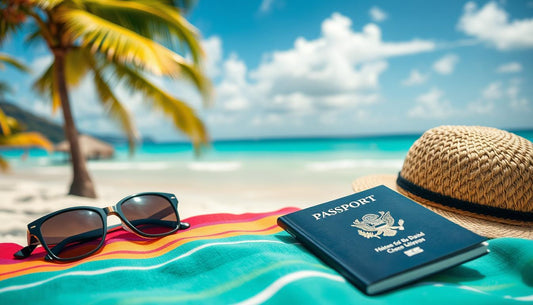Monaco, the glamorous and sun-soaked principality on the French Riviera, is often associated with luxury, wealth, and a unique lifestyle. But when it comes to taxes in Monaco, things are a bit different from most countries. Monaco offers one of the most attractive tax systems in the world, making it a popular destination for the wealthy, expats, and business owners.
Unlike most countries, Monaco doesn’t impose income tax on its residents, which is a huge draw for those looking to minimize their tax burden. However, understanding Monaco’s tax structure is key to making the most of its benefits, especially for both individuals and businesses in 2025. In this article, we’ll break down the top 5 things you need to know about taxes in Monaco, from personal tax exemptions to corporate benefits and real estate taxes.
1. Monaco's Income Tax System
Does Monaco Have Income Tax?
One of the most attractive features of Monaco is its income tax system—or, more accurately, the lack of one. Monaco does not impose an income tax on its residents, making it a tax haven for individuals and businesses alike. This absence of personal income tax is the main reason why so many high-net-worth individuals choose to make Monaco their home.

However, it’s important to note that French nationals and people living in Monaco but working across the border in France are subject to French income tax laws. This means if you’re a French citizen or living in Monaco while working in France, you will still need to pay French taxes on your income.
If you are a Monaco resident and earn income solely from within Monaco, you can rest easy knowing that you’ll keep your entire salary, investment income, or other earnings without any income tax deductions. This tax advantage is one of the main draws for many people looking to reduce their overall tax burden.
2. Corporate Taxes in Monaco
Corporate Tax Rates
While Monaco is known for its lack of income tax on individuals, it does have corporate taxes. However, these are much lower than in many other countries, and there are several benefits to doing business in Monaco.

Monaco’s corporate tax rate is 33.33%, but this applies only to companies that derive more than 25% of their revenue from activities outside of Monaco. This means that if a company conducts all or most of its business within Monaco, it can be exempt from corporate tax. Many businesses are drawn to Monaco for this very reason, as it allows them to enjoy a favorable tax environment while benefiting from the country's prestigious location and top-notch infrastructure.
Additionally, Monaco offers a variety of tax incentives for international businesses. These include tax exemptions for certain types of activities, as well as special programs to encourage investment and innovation. Businesses looking to expand internationally often choose Monaco because it offers the opportunity to benefit from favorable tax conditions while also providing access to Europe and beyond.
International Business Structures
Monaco is a perfect location for companies with international operations, thanks to its favorable tax regime. Companies with offshore activities may set up business structures in Monaco to take advantage of its corporate tax benefits while maintaining a global presence. Entrepreneurs and investors alike are drawn to Monaco because of its flexible business environment, ease of incorporation, and the absence of wealth taxes.
3. Real Estate and Property Taxes in Monaco
Property Taxes in Monaco
When it comes to real estate, Monaco has its own set of rules and taxes. Unlike many countries that impose hefty property taxes, Monaco has relatively low taxes for property owners, making it a desirable place for real estate investors.

- Property Purchase Tax: When purchasing real estate in Monaco, buyers are subject to a one-time property tax of approximately 7.5%. This tax is paid on the total purchase price of the property and includes registration and notary fees. For those investing in Monaco real estate, this is a relatively low cost compared to other countries.
- Annual Property Taxes: Monaco also has annual property taxes, which are quite low compared to international standards. Property owners are responsible for paying these taxes on an annual basis, and the amount varies depending on the size and location of the property.
- Capital Gains Tax: Monaco does not charge capital gains tax on the sale of real estate. This makes it an attractive destination for investors looking to buy and sell property for profit. It’s important to note, however, that capital gains tax may apply if the property is sold by a French national or a person who has worked in France.
The combination of low property taxes and the absence of capital gains tax makes Monaco an attractive place for both individuals and businesses looking to invest in real estate.
4. Social Security and Other Contributions in Monaco
Social Security Contributions
While Monaco is famous for its lack of income tax, it does require contributions to its social security system. These contributions are mandatory for all employees and business owners. The amount you pay depends on your income level, with higher earners contributing more.

- Employee Contributions: Employees pay a portion of their salary to the social security system, which covers healthcare, pensions, and other social benefits. The rate for employees is typically around 13.5%, with some of this deducted from wages and the remainder covered by the employer.
- Self-Employed Contributions: If you are self-employed in Monaco, you are required to contribute to the system as well. The rates for self-employed individuals may vary, depending on their income, but typically follow a similar structure to employee contributions.
Although Monaco’s social security contributions can be higher than in some other jurisdictions, they provide residents with access to excellent healthcare and retirement benefits, which make it a worthwhile investment.
5. Why Monaco Remains Attractive for Expats and Investors
No Income Tax and High Quality of Life
Monaco is consistently ranked as one of the most desirable places to live in the world. With no income tax for residents (aside from French nationals) and a stunning location on the Mediterranean coast, it’s easy to see why Monaco remains a favorite for wealthy expats and investors.

Beyond its tax advantages, Monaco offers a high quality of life, with excellent healthcare, world-class education, and a safe, luxurious environment. The country also boasts a thriving business scene, making it an ideal place for entrepreneurs and international companies to establish a presence.
For expats, Monaco offers not only a tax-friendly environment but also a cosmopolitan lifestyle with a vibrant cultural scene, world-renowned events like the Monaco Grand Prix, and unparalleled access to the Mediterranean and European markets.
Conclusion
In conclusion, understanding taxes in Monaco in 2025 is essential for anyone considering living or doing business in this beautiful principality. With its income tax exemptions, low corporate tax rates, minimal real estate taxes, and attractive social benefits, Monaco continues to be a top destination for expats and investors alike.
By staying informed about Monaco’s tax laws and benefits, you can make the most of the opportunities this tax-friendly environment provides. If you're considering relocating to Monaco or setting up a business there, it’s always a good idea to consult with a tax professional to ensure you’re fully compliant and taking advantage of all available benefits.
Ready to make the most of Monaco’s tax advantages? Speak to a Monaco tax expert today and explore how you can benefit from its unique tax system.








